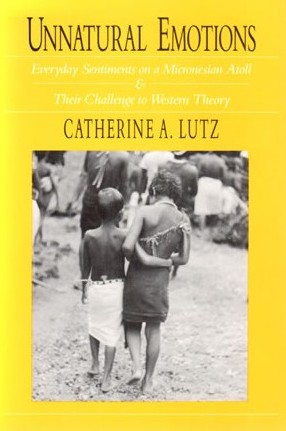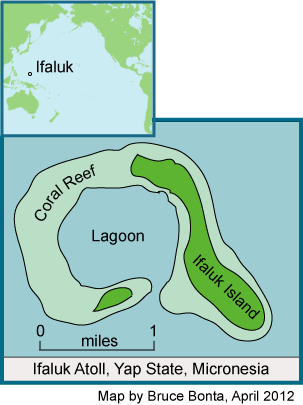Ifaluk
Location. The 2000 census of Yap State recorded 561 people living on Ifaluk Island, a coral atoll in the Pacific Ocean nation of Federated States of Micronesia, which was formerly called the Caroline Islands.

Economy. The primary economic activities of the Ifaluk are fishing and gardening. According to the 2000 census, 89.3 percent of the adult population engage in subsistence activities.
Beliefs that Foster Peacefulness. The Ifaluk concept of song, justifiable anger, differs from their other concepts of anger and from anger as it may be defined in other societies. Song is not used for feelings about unpleasant or frustrating events; it is only used to describe reactions to morally-condemned actions. Song is a pro-social concept which identifies actions that may disturb the moral order or violate the values of society. The normal reaction to someone feeling song toward another is for the latter to then feel metagu, a fear of what that angered person will do. This anticipation and fear of justifiable anger from others prompts people to adhere to the island’s peaceful social codes.
Avoiding and Resolving Conflict. While interpersonal violence is almost nonexistent among the Ifaluk, whenever people do become justifiably angry, they recognize the possibility of aggression and they expect their mechanisms of self-control to prevent it. People will remind the angry person of island values: everyone will laugh at you if you fight; reject your angry feelings; remember that other family members will be frightened if you should fight. Noted emotional counselors will speak quietly, calmly, and politely, perhaps suggesting a solution to the problem or recommending that the angry person forget it. The object of the anger soon hears about it, becomes anxious and fearful about the situation, so apologies are given, fines are paid, or gifts are sent to restore the peace.
Gender Relations. The roles and statuses of men and women are clearly distinguished on Ifaluk.
- Separate Spheres. While husbands and wives may be together some during the day, mostly the men fish, make canoes, repair things, or supervise children, while women work in the taro gardens or in the homes preparing food, caring for infants, or weaving. The women never go into the men’s canoe houses, the men never go into the women’s birth houses.
- Respect. Women show respect to men when they do pass them in public, bending forward at the waist as they walk past as a sign of deference. A woman must show particular respect for her brother—when he is seated indoors, she crawls past him on hands and knees to avoid having her head above his.
- Status and Control. In spite of this, women have significant status and control. They control the children, households, and garden produce, while men control the distribution of fish and the rights to certain coconut trees. Men are thus dependent on their mothers, sisters and wives for shelter and most of their food.

Raising Children. The Ifaluk do not often discipline their children with physical punishment—they prefer lecturing to spanking. They fear that children who are hit could “go crazy,” kill themselves, or become aggressive. They teach their children proper values when they are about five or six, and they display song whenever the child misbehaves and metagu, fear, in the presence of strangers. To reinforce the feelings of metagu, adults teach children that a ghost will “get them” if they misbehave. Sometimes, one of the women, dressed up in a ghost costume, appears menacingly near the home threatening to eat the wayward child. The terrorized child quickly associates its antisocial and aggressive actions with its metagu and with the parents’ song.
Sense of Self. The Ifaluk do not have a fixed boundary between self and other, since people assume that it is natural to be influenced by the thoughts and feelings of others. They use the first person plural pronoun (we) in preference to the singular (I) a great deal: instead of saying, “I would like to do x with you,” they would say, “we should do x together.” They will use what Westerners might call the royal “we,” when the first person singular is implied in normal English usage. People are reluctant to set themselves apart from others or to indicate a desire to do something that does not involve other people.
Sharing. Food, tobacco, and other goods on Ifaluk are shared; they are viewed as “our” food, “our” cigarettes, and so forth. The Ifaluk will share a cigarette around a group, divide one fish among many people if there is only one, and share the work of household tasks. The stingy person is disliked throughout the island as much as the hot-tempered one. People can’t give away as gifts these kinds of items, since they belong to everyone anyway, and anyone who tried to take credit for a gift of food would be condemned. On the other hand, clothing, bush knives, and certain personal possessions clearly belong to the individual.
 Strategies for Avoiding Warfare and Violence. One way the Ifaluk avoid violence is by fostering feelings of horror for it. On several occasions since World War II, United States Navy vessels stopped at the island and showed American films. The violence displayed in those movies–people being beaten and shot–panicked the islanders, terrifying some into illnesses that lasted for days. Many subsequently refused to watch American films. They constantly reviewed and talked about the violent scenarios, reinforcing their safety from violence. Their hierarchical social system and the benevolent authority of their chiefs also help maintain an almost complete absence of crime on the atoll.
Strategies for Avoiding Warfare and Violence. One way the Ifaluk avoid violence is by fostering feelings of horror for it. On several occasions since World War II, United States Navy vessels stopped at the island and showed American films. The violence displayed in those movies–people being beaten and shot–panicked the islanders, terrifying some into illnesses that lasted for days. Many subsequently refused to watch American films. They constantly reviewed and talked about the violent scenarios, reinforcing their safety from violence. Their hierarchical social system and the benevolent authority of their chiefs also help maintain an almost complete absence of crime on the atoll.
But How Much Violence Do They Really Experience? Edwin Burrows reported that during his six months on Ifaluk he never heard any expressions of anger, even when people had had too much to drink. The Ifaluk are as kindly and non-aggressive in actuality as they think they are. During the year that Catherine Lutz lived on Ifaluk, the most serious act of aggression was one man touching the shoulder of another—which resulted in a stiff fine. Betzig and Wichimai, in an article that questions Ifaluk peacefulness, indicate that there is one man alive who remembers his grandfather’s tale of the time he tried to sneak into a village after a woman, but he was intercepted, chased, and beaten by the villagers.
Scholarly Resources in this Website:
- “Morality, Domination and Understandings of ‘Justifiable Anger’ among the Ifaluk.” (Lutz, 1990)
More Resources in this Website:
- When a yacht visited Ifaluk in 2012, the captain noted how the people preserve their traditional culture and way of life.
Sources in Print: Betzig and Wichimai 1991; Burrows 1952; Burrows 1963; Lutz 1982, 1983, 1985, 1988, 1990; Spiro 1952
Sources on the Web: Humanistic Texts: Ifaluk; Marshall 1994; Mallon and Stick 1999; Video of Ifaluk kids
Updates—News and Reviews:
Selected Recent Stories
November 19, 2015. Comparing Kauai and Ifaluk
June 11, 2015. An Erection Points toward Peace on Ifaluk
May 15, 2014. A Visitor on Ifaluk
All Stories
All stories in this website about the Ifaluk are listed in the News and Reviews Subject Listing

